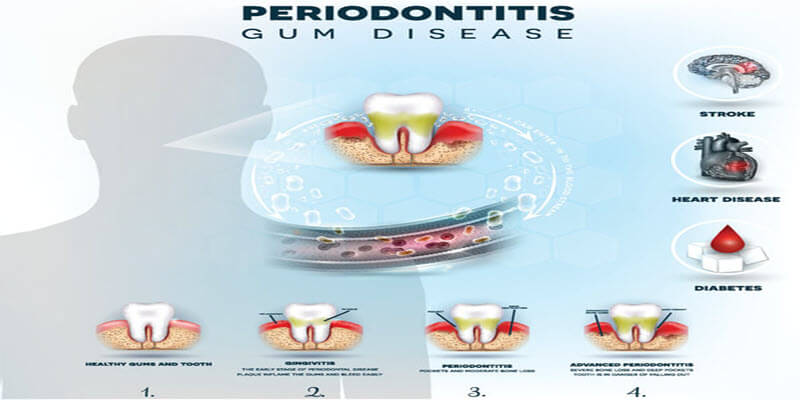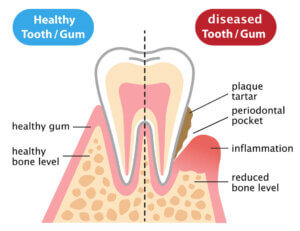Periodontitis, a common dental condition, can have a significant impact on oral health if not properly managed. According to Dr. Kissel, periodontitis is a stage of gum disease that usually results from poor dental hygiene. However, sometimes genetics can be the root cause of the condition. It’s a multi-staged disease, which starts with gingivitis.
In order to help you gain a clearer understanding of the development of gum disease, we will delve into the various stages of periodontitis, explore potential complications, and discuss effective management strategies.
What is Periodontitis?
Periodontitis is a bacterial infection that starts by inflaming the soft tissues around your teeth. If left untreated, it can spread below the gums and along the tooth roots and erode the bone that supports your teeth, leading to loosened teeth or even tooth loss. Periodontitis can also increase your risk of developing other diseases, such as diabetes, heart disease, and stroke. According to Harvard Medical School, “People with gum disease (also known as periodontal disease) have two to three times the risk of having a heart attack, stroke, or other serious cardiovascular event.”
 Prevalence of Periodontitis
Prevalence of Periodontitis
According to a CDC report, 42.2% of adults aged 30 years or older in the USA have some form of periodontitis, and 7.8% have severe periodontitis. The prevalence of periodontitis increases with age, reaching 70.1% among adults aged 65 years or older. As the population of older adults in the USA is expected to grow significantly in the next decades, periodontitis will remain a major public health problem that requires prevention and treatment.
What are The Stages of Periodontitis?
Periodontitis can be classified into four stages according to the severity of the disease and the complexity of treatment:
Stage I: Initial Periodontitis
If you do not receive treatment for your gingivitis, it will develop into periodontitis. The first stage is characterized by mild inflammation and bleeding of the gums, and slight loss of attachment between the gums and the teeth. The pocket depth (the space between the gums and the teeth) is usually between 3 and 4 millimeters (mm). There is no or minimal bone loss around the teeth. Unlike gingivitis, which is reversible, periodontitis, even at the initial stage, can not be reversed but it can be managed by your NYC periodontist.
Stage II: Moderate Periodontitis
This stage is characterized by moderate inflammation and bleeding of the gums, and moderate loss of attachment between the gums and the teeth. The pocket depth is usually between 4 and 5 mm. There is up to 33% of bone loss around the teeth.
Stage III: Severe Periodontitis
There is potential for tooth loss at this stage. It is characterized by severe inflammation and bleeding of the gums, and severe loss of attachment between the gums and the teeth. The pocket depth is usually more than 6 mm. There is more than 33% bone loss around the teeth, and some teeth may become loose or shift in position.
Stage IV: Advanced Periodontitis
At this stage, your gums will be severely inflamed, resulting in bleeding of the gums, and you’ll experience severe loss of attachment between the gums and the teeth. The pocket depth is usually more than 6 mm. There is extensive bone loss around the teeth, and many teeth may be missing or need to be extracted.
What are the Complications of Periodontitis?
Periodontitis can cause various complications that affect not only your oral health but also your overall health. Some of these complications are:
- Damage the tissues that support your teeth, making them loose and unstable. You may lose some or all of your teeth if they cannot be saved by treatment.
- Gum recession since your gums begin to pull away from your teeth, exposing some of your tooth roots. This can make your teeth look longer and more sensitive to hot or cold foods and drinks.
- Pus-filled pockets may form in your gums or jawbone. These abscesses can be painful and may spread infection to other parts of your body.
- An inflammatory response in your body that can affect other organs and systems. This can increase your risk of developing diabetes, heart disease, stroke, rheumatoid arthritis, respiratory infections, and pregnancy complications.
How to Manage Periodontitis?
Periodontitis can be managed by a combination of professional dental care and good oral hygiene at home. Depending on the stage and grade of your periodontitis, you may need one or more of the following treatments:
- Scaling and root planing (SRP): This is a deep cleaning procedure that removes plaque and tartar from your tooth surfaces and below your gumline. It also smooths the root surfaces to help prevent further buildup of bacteria. At Dr Kissel’s NYC periodontal office, we prioritize your comfort, during and after the procedure, and provide optimal results. Dr Kissel can achieve this by performing SRP using a perioscope (powerful dental endoscope/microscope that can display a magnified image (24-48x), allowing him to see any tartar you may have directly on the root of the affected tooth in large detail).
- Antibiotics: These are medicines that kill or stop the growth of bacteria that cause infection. They can be applied topically as mouth rinses or gels, or taken orally as pills or capsules.
- Flap surgery or pocket reduction surgery: This is a surgical procedure that lifts back your gums to expose the roots of your teeth for better cleaning. It also reshapes the bone around your teeth to reduce the depth of the pockets.
- Soft tissue grafts: This is a surgical procedure that uses tissue from another part of your mouth or a donor to cover exposed tooth roots and restore your gumline. Dr. Kissel also performs the pinhole technique. This procedure, which is minimally invasive, allows Dr. Kissel to treat gum recession without accessing tissue from the roof of the mouth. Dr. Kissel uses microsurgery techniques during gum grafting surgeries because it makes the procedure easier to perform and allows patients to heal faster. It also makes the surgery less painful for patients – which is a huge plus for many patients. In fact, Dr. Kissel’s patients report that with microsurgery techniques, they experience less discomfort from the surgery and heal faster and without complications compared to patients who use traditional surgical instruments and techniques.
- Bone grafts or regeneration procedures: These surgical procedures use bone from another part of your body or a synthetic material to replace lost bone around your teeth. Bone grafting also stimulates new bone growth to support your teeth.
- Dental implants: These are artificial replacements for missing teeth that restore your smile and chewing function. For over 25 years, Dr. Kissel has been placing the highest-quality dental implants using microsurgery techniques to replace missing teeth.
How to Prevent Periodontitis?
The best way to prevent periodontitis is to practice good oral hygiene every day. This includes:
- Brushing your teeth twice a day with a fluoride toothpaste and a soft-bristled toothbrush to avoid harming your teeth and gums.
- Flossing your teeth once a day to remove plaque and food particles from between your teeth and under your gumline. This can remove plaque from below the gumline, which can destroy tooth enamel and develop into tartar.
- Rinsing your mouth with an antiseptic mouthwash or water after brushing and flossing to kill plaque-causing bacteria.
- Visiting your dental professional regularly for checkups and cleanings, at least twice a year or as recommended by your dentist or periodontist.
- Quitting smoking or using other tobacco products, as they increase your risk of developing periodontitis and other oral diseases.
- Eating a balanced diet that is low in sugar and high in vitamins and minerals that support your oral health.
- Managing any medical conditions that may affect your oral health, such as diabetes, by following your doctor’s advice and taking your medications as prescribed.
Why Choose Dr. Kissel for Your Periodontal Care?
Dr Kissel is a board-certified periodontist and dental microsurgery specialist who has been serving the Manhattan area for over 20 years. He is an expert in diagnosing and treating all stages of periodontitis using the latest techniques and technologies including dental microsurgery, LANAP laser treatments, and the Pinhole technique. He is also a leader in performing minimally invasive dental implant surgery that offers faster healing and superior results.
Dr Kissel and his team are committed to providing you with the highest quality of care and the best possible outcomes for your oral health. They will work with you to create a personalized treatment plan that suits your needs and goals. They will also educate you on how to maintain your oral hygiene and prevent future problems.
Contact Dr Kissel to Book Your Consultation
Periodontitis is a serious dental condition that demands attention and effective management. By understanding its stages, potential complications, and management strategies, you can take proactive steps to protect your oral and overall health. Remember, early intervention and consistent oral care are key to keeping periodontitis at bay. Take the first step towards a healthier, more attractive smile by booking a consultation with Dr Kissel.
Consulting with an NYC board-certified periodontist, like Dr Kissel who is always up-to-date with new treatments and procedures, you will receive periodontal care that is backed by current research. If you have periodontal issues, contact him to book your consultation. With advanced training in periodontitis / gum disease, laser surgery, and microscopic procedures, he can offer you minimally invasive techniques that provide better precision, comfort, and results. He also provides a variety of amenities and resources to make your experience in his periodontal office more comfortable and relaxing. Call his Madison Avenue periodontal office in New York City for a consultation at (212) 702-9088.

 Prevalence of Periodontitis
Prevalence of Periodontitis